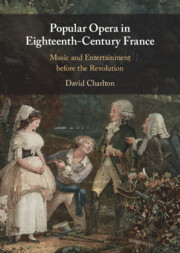Book contents
- Popular Opera in Eighteenth-Century France
- Popular Opera in Eighteenth-Century France
- Copyright page
- Dedication
- Epigraph
- Contents
- Illustrations
- Tables
- Examples
- Preface
- Acknowledgements
- Notes on the Text
- Abbreviations
- 1 Introduction
- 2 Music and Spoken Theatre
- 3 Music in Gherardi’s Company
- 4 Singing and Acting at Home
- 5 Opéra-comique en vaudevilles
- 6 Experiences of Popular Theatre
- 7 Comic and Serious Themes
- 8 Performance as History
- 9 Musical Expansion
- 10 Italian Inroads: The King’s Company
- 11 Six Methods of Synthesis
- 12 A ‘Musico-Dramatic Art’
- 13 Conclusions
- Stage Works Cited
- Bibliography
- Index
13 - Conclusions
Published online by Cambridge University Press: 09 December 2021
- Popular Opera in Eighteenth-Century France
- Popular Opera in Eighteenth-Century France
- Copyright page
- Dedication
- Epigraph
- Contents
- Illustrations
- Tables
- Examples
- Preface
- Acknowledgements
- Notes on the Text
- Abbreviations
- 1 Introduction
- 2 Music and Spoken Theatre
- 3 Music in Gherardi’s Company
- 4 Singing and Acting at Home
- 5 Opéra-comique en vaudevilles
- 6 Experiences of Popular Theatre
- 7 Comic and Serious Themes
- 8 Performance as History
- 9 Musical Expansion
- 10 Italian Inroads: The King’s Company
- 11 Six Methods of Synthesis
- 12 A ‘Musico-Dramatic Art’
- 13 Conclusions
- Stage Works Cited
- Bibliography
- Index
Summary
With quotations from Phiip Gossett, Rebecca Harris-Warrick and Tom Christensen, the argument is reiterated for an ‘integrative model for French opera’ that includes opera with spoken dialogue. The importance of the independent, commercial theatre and the cultural value it commanded in Paris are summarised. Knowledge of French popular opera is demonstrable elsewhere, with London the obvious example shown in research by Vanessa Rogers and Erica Levenson. The nature of John Gay’s musical integrations in The Beggar’s Opera is compared with Paris practice and with Brecht’s in Die Dreigroschenoper. Key discoveries in the book are reviewed, especially the ‘new’ manuscript for La Chercheuse d’esprit. Opéra-comique research by Thomas Betzwieser and Ruth Müller is summarised and related to the current project, ending with further quotations from Tom Sutcliffe, Thomas Bauman and Alfred Roller.
- Type
- Chapter
- Information
- Popular Opera in Eighteenth-Century FranceMusic and Entertainment before the Revolution, pp. 310 - 320Publisher: Cambridge University PressPrint publication year: 2021

